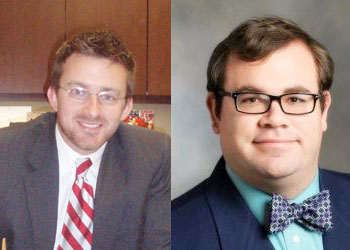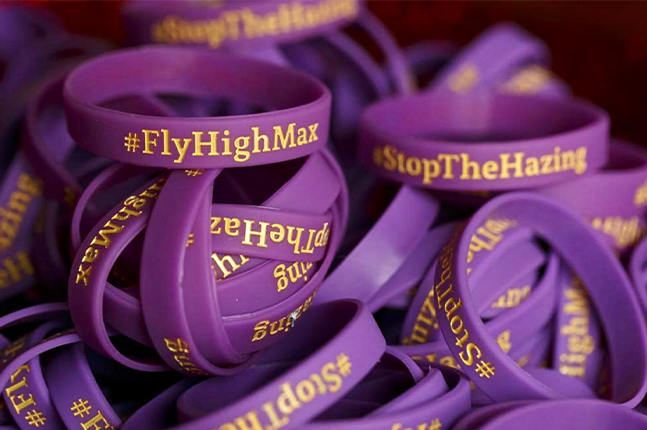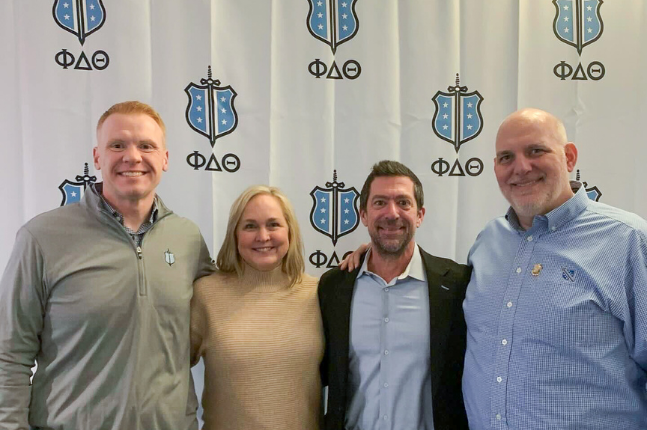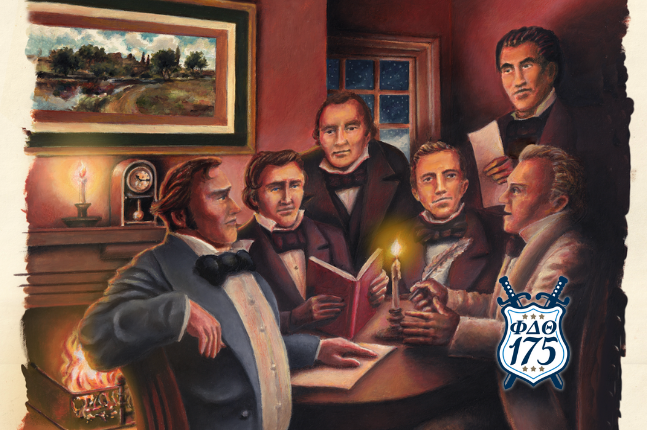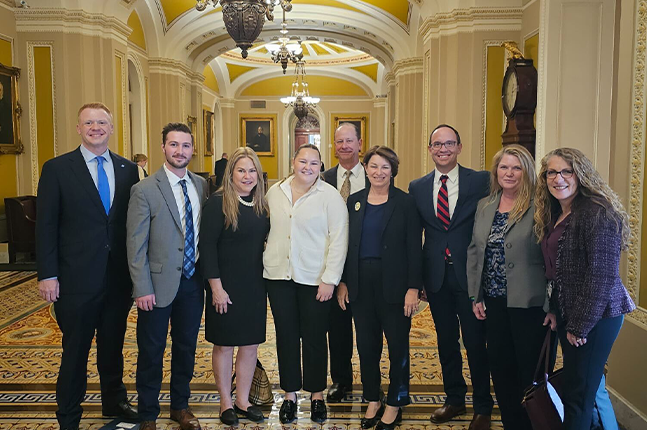By Gentry McCreary, Ph.D. and Joshua Schutts
Hello members, friends, and fans of Phi Delta Theta. In honor of National Hazing Prevention Week, my colleague, Josh, and I want to talk about brotherhood, but first, you need some background. About this time last year, I reached the halfway point of my doctoral dissertation. I was studying the impact of moral judgment and moral disengagement on hazing attitudes, and I was putting the finishing touches on the third chapter and preparing for my proposal defense. My study, in a nutshell, was investigating the environmental variables that support a pro-hazing culture. As I sat and thought about my study, I came to ask myself the question “What matters?” Several fraternities have shaken things up in the last few years and significantly changed the environment in which hazing occurs. Phi Delta Theta has the “Don’t Tarnish the Badge” campaign. Sig Ep has the “Balanced Man Program. “Beta Theta Pi has the “Men of Principle Initiative.” Alpha Gamma Rho and Zeta Beta Tau got rid of pledging altogether. As I sat and pondered these changes, I asked myself “If we wanted to know if any of these changes have had any impact, what would I even measure? It’s hard to measure hazing, so what do we measure? What would we expect the impact of these changes to be?” As I sat and thought, rolling around different possibilities in my head, I kept coming back to the same idea – brotherhood.
What is brotherhood? How do students define it? Are there different kinds of brotherhood? How do you measure it? I pondered these questions and more for several days, and I decided that the best way to get an answer to my question was to ask students. So, I sent out an email to my fraternity member listserv and asked for a few volunteers to come meet with me to talk about brotherhood. On the day of the meeting, a dozen or so guys showed up, and I asked a simple question: “What is brotherhood?” I sat and listened, scribbling notes furiously trying to keep up with the conversation, as the young men bounced the question back and forth. Several themes emerged from that conversation, but when I coded my notes, the students discussed four separate and distinct definitions of brotherhood. They were:
- My brothers support me and “have my back” because we’ve been through a lot together. They would do anything for me, and I would do anything for them.
- My brothers and I do almost everything together – they are the people I prefer to spend most of my time with and we always have a blast, whatever we’re doing.
- My brothers and I are drawn together by our similar beliefs, values and backgrounds. They are my best friends and will be the groomsmen in my wedding.
- My brothers help make me a better person by holding me to high standards based on our shared values.
At this point, my head was spinning. Four completely different themes, sometimes used in combination with one another, sometimes not, had emerged from that initial conversation. My next step was to try to make sense of all this new information, so I called up the one person who I consider to have the ultimate combination of fraternity and nerdy quantitative research skills – Josh Schutts. Josh, I’ll let you jump in here and help us make sense of all this.
Admittedly, I came into the fold in many conversations with Gentry about his work with hazing and moral judgment. He mentioned brotherhood and I was immediately hooked. I presume that for many of you, brotherhood is the reason you joined your chapter, and is likely the reason you are still affiliated. My background is in business, so I tend to view our fraternity chapters much like “mini businesses.” In saying that: fraternities don’t have a profit-motive, we have a brotherhood motive. If Apple or Microsoft is for-profit, then Phi Delta Theta is for-Brotherhood.
Conceptually, brotherhood is the currency of fraternity. It is sold to potential members, traded between brothers and alumni, and deposited within our thoughts and memories for all time. As an alumnus of my organization, I recall those memories from time to time – the things we did as friends and brothers. The trouble we got in, the relationships we made, the times we laughed, and the times where we were there for each other. Perhaps a brother could be thought of as “more than a friend, but no less than someone you love.” I heard a wise past national president of Sigma Alpha Epsilon say that once (Jim Pope, Southern Mississippi).
Theoretically, the research is frankly scant in relation to brotherhood. It’s kind of funny that something that means so much to so many is largely unstudied, undocumented, and unanalyzed. I mentioned earlier about brotherhood as a currency. If you buy that, then when we trade or sell it, we are completing a transaction – let’s call it a social transaction, or maybe even a social exchange. Near as I can tell, the best theoretical framework that exists comes from Blau & Scott (1962) who coined “social exchange theory” and talked about mutual benefit associations. I think of fraternities as mutual-benefit associations, so I think there is some wisdom to be found there. Further, Clawson (1989) talks about masculine solidarity and touched on loyalty through race, social class, and gender.
With this theoretical framework in mind, we sat out to devise a way to measure brotherhood. A list of questions was developed that corresponded with each of the four definitions of brotherhood, with a five-point “agree/disagree” scale. We constructed some initial testing on the instrument, determined that it was good, and set to work. We had to put a name to each of the four types, based on the definitions from the focus group and the questions in the instrument, and here is what we came up with (numbers corresponding to the definitions that Gentry described above):
- Brotherhood Based on Gang Mentality (BROGM)
- Brotherhood Based on Shared Social Experiences (BROSSE)
- Brotherhood Based on Common Interests (BROCI)
- Brotherhood Based on Accountability to Shared Values (BROASV)
We measured brotherhood with our instrument, and we also asked students about their alcohol use, attitudes towards hazing, attitudes about the purpose of the new member process, questions about the importance of social status in their chapter, and a scale that measured their moral development.
What we found amazed us.
Student’s scores on BROGM had strong and significant correlations with pro-hazing attitude. Those correlations became weaker as they moved up the scale, and a high score on BROASV had a negative correlation with hazing attitude. The way students defined brotherhood was predictive of the way they perceived hazing and the amount of hazing they stated they would tolerate in their chapter.
We also measured students’ perceptions of the purpose of the new member process (with statements like ‘the pledging process is an opportunity to weed out weak new members’ and ‘it is important that pledges demonstrate their loyalty to the fraternity before they are initiated’) and had similar findings. Students that measured highest on BROGM were much more likely to have an antiquated view of the purposes of the new member process, and again, the relationships became weaker as they moved up the scale. BROASV was negatively correlated with the scale measuring the perception of the purposes of the new member process.
So, conceptually we have many ideas about what brotherhood is. Most of what we know so far is anecdotal, qualitative and contextual. We tell stories to others, and somehow in our mind, we understand what brotherhood means. . . what it means to us anyways. But does it stop there? What if brotherhood means different things to different people? How can we merge what it might mean to you with someone else’s concept? Wouldn’t it be easier to ‘sell’ that to an interested prospective member? We think you can. And we think that if we could quantitatively measure it, or at least most of it, then we would have a common language to talk to our brothers about.
When we begin to understand what brotherhood is, we can then take the leap to see how it manifests and changes. We first begin by understanding its nature. What it is comprised of, and equally, what is it not comprised of. We think about where it comes from, and we think about the best way we measure it. Next, we begin to see it as the ‘cause’ and search for the symptoms or effects it has on people, chapters, institutions, and communities. We measure it over time, and we see if differences exist between race, or age, or number of years as a member of a fraternity. We see these symptoms as antecedents, and we ask questions about what aspects of brotherhood correlate to that are both positive and negative. We look at hope, and commitment, and unethical behavior, and citizenship behavior, and engagement, and moral judgment, organizational learning, and a host of other things that are related to things that occur in our chapters every day.
What good is all of this? Well, for starters, we could diagnose issues in chapters. We could get to the cause, and quit treating the symptoms. We could leave our campuses better than we found them. We could make a difference in someone’s life. We could be more relevant tomorrow than we were yesterday. In sum: We could become the greatest version of ourselves, and help our Chapters achieve a new level of greatness as well.
Gentry McCreary is the Associate Dean of Students at the University of West Florida in Pensacola, FL. He served four years as the Director of Greek Affairs at the University of Alabama, and two years as Director of Greek Life at Middle Tennessee State University. He is a member of Alpha Gamma Rho fraternity from the University of Tennessee. He completed a master’s degree in Higher Education and Student Affairs from the University of South Carolina, and a Ph.D. in Higher Education Administration from the University of Alabama. His research interests include moral development and the social-psychological causes of hazing. Gentry is an avid outdoorsman who enjoys backpacking, canoeing, golf, fishing and upland bird hunting with his German Shorthaired Pointer, Ellie.
Joshua Schutts is the Assistant Dean of Students at The University of Southern Mississippi and a 2000 initiate of the Delta Mu chapter of Pi Kappa Alpha fraternity. He has a B.S.B.A. in Marketing and a M.Ed in Student Affairs Administration from the University of Southern Mississippi. He is currently pursuing a Ph.D in Research, Evaluation, Statistics, and Assessment at the University of Southern Mississippi. He enjoys playing golf and fantasy football. Josh and his dog Roosevelt live in Hattiesburg, MS.

